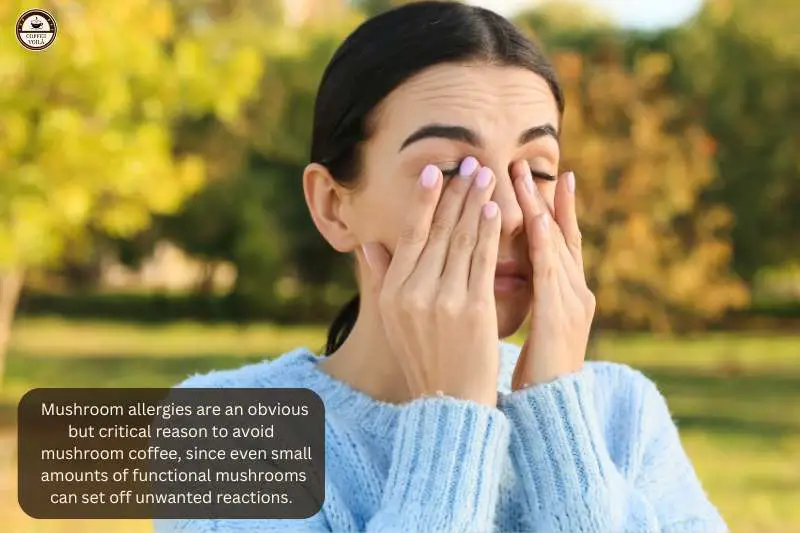Who Should Not Drink Mushroom Coffee? Key Risks to Know
Last updated on September 9th, 2025 at 10:31 am
Have you ever wondered if mushroom coffee is really safe for everyone?
Even though I never had any issue with mushroom coffee. Actually, it gave me smoother energy and less of that caffeine crash. The same can’t be said for everyone.
Unfortunately, not all people can enjoy the benefits. Some might deal with allergies, medication interactions, or even worsened health conditions if they drink it. That’s the part most marketing skips, but it’s essential to be clear about.
The problem is simple: mushroom coffee blends mix caffeine with powerful functional mushrooms like reishi, lion’s mane, or cordyceps.
These mushrooms contain bioactive compounds that affect the body in different ways. Sometimes great, sometimes not. For most healthy adults, it’s no big deal. However, for others, it can lead to uncomfortable side effects or even health risks.
So in this guide, you’ll learn who should not drink mushroom coffee, what side effects to watch for, and which safer alternatives might make more sense. By the end, you’ll know if mushroom coffee is the right fit for your lifestyle.
5 Reasons You Shouldn’t Drink Mushroom Coffee
Not everyone is a good match for mushroom coffee. So, ere’s a quick breakdown of the main reasons some people should avoid it—skim the list now, and read the full sections below if you want all the details.
| Reason | Quick Explanation |
|---|---|
| 1 – Mushroom allergies or sensitivities | Can trigger reactions like rashes, stomach upset, or breathing issues—even from “functional” mushrooms like reishi or lion’s mane. |
| 2 – Pregnant or breastfeeding women | Safety isn’t well studied; some mushrooms may affect hormones or blood pressure. Better to avoid until more research is done. |
| 3 – Autoimmune conditions | Mushrooms stimulate the immune system, which may worsen conditions such as lupus, rheumatoid arthritis, or multiple sclerosis. |
| 4 – Taking certain medications | Risky with blood thinners, blood pressure meds, diabetes drugs, or immunosuppressants due to possible interactions. |
| 5 – Sensitive to caffeine | Mushroom coffee has less caffeine but not zero. It may still trigger anxiety, insomnia, or heart palpitations. |
1 – People With Mushroom Allergies or Sensitivities
If you have a known mushroom allergy, mushroom coffee is not for you. Even so-called “functional mushrooms” like lion’s mane (Hericium erinaceus) or cordyceps (Cordyceps militaris) can trigger reactions.
These fungi contain unique compounds, such as polysaccharides, sterols, cordycepin, and erinacines. That may trigger the immune system in sensitive people.

Typical symptoms include digestive upset (bloating, nausea), skin reactions like rashes or itching, and in more severe cases, swelling or difficulty breathing.
The 2024 study on mushroom coffee even listed allergies as one of the top contraindications, alongside conditions like hypertension and histamine intolerance.
That’s because mushroom bioactives can sometimes act as histamine triggers, worsening issues for people who already struggle with food sensitivities.
Another wrinkle is that mushroom coffee powders aren’t standardized. A serving from one brand may have a different concentration than another. This makes it harder to predict how your body will respond.
Notes: If you’ve ever experienced mushroom intolerance, even something as mild as stomach upset, it’s best to avoid mushroom coffee altogether.
2 – Pregnant or Breastfeeding Women
When it comes to pregnancy and breastfeeding, mushroom coffee is one of those “better safe than sorry” drinks. The truth is, there isn’t enough solid research yet to confirm that it’s safe during these stages of life.
While coffee itself already comes with guidelines like limiting caffeine to around 200 mg a day. However, adding functional mushrooms on top introduces extra variables that haven’t been fully studied in pregnant women or nursing mothers.

Some mushrooms commonly found in mushroom coffee, such as reishi, can potentially influence blood pressure or hormone balance. That might be fine for a healthy adult. But during pregnancy those shifts can add unnecessary risk.
On the other hand, cordyceps is often marketed for energy and performance. Still, its stimulating effects on the immune system and metabolism could complicate things if your body is already under stress.
Another popular mushroom is Lion’s mane, known for supporting nerve health. But once more, there’s no clear research on its impact during pregnancy or lactation.
If you’re expecting or nursing, it’s much safer to stick with either regular coffee in moderate amounts or caffeine-free alternatives like chicory coffee or herbal teas.
That way, you still get a warm cup without risking unknown effects. And if you want the potential benefits of functional mushrooms later on. You’ll have plenty of time to add them back once your body (and your baby’s) no longer depends on those extra layers of caution.
Notes: The absence of evidence isn’t the same as proof of safety. Until more clinical studies are done, avoiding mushroom coffee while pregnant or breastfeeding is the responsible choice.
3 – People With Autoimmune Conditions
If you’re dealing with an autoimmune condition, mushroom coffee isn’t something to jump into lightly. The reason is that mushrooms like cordyceps, reishi, or lion’s mane are often praised for their immune-boosting properties.
Sure, that sounds great at first. The problem is that if your immune system is already misfiring, as seen in conditions like lupus, rheumatoid arthritis, or multiple sclerosis, pushing it harder can make things worse.

Researchers point out that mushrooms contain bioactive compounds such as polysaccharides and beta-glucans that interact with immune pathways.
These compounds can improve immune activity. This may be helpful for fighting off infections. But risky for people whose immune systems are already overactive.
For example, reishi has been shown to lower blood pressure and modulate immune responses. Meanwhile, cordyceps militaris is known for ergogenic and immunostimulating effects.
In healthy individuals, that can translate into better performance and resilience. For autoimmune patients, it could add fuel to the fire.
Medication
Many autoimmune conditions are managed with immunosuppressants. If you’re taking drugs that intentionally dial down your immune system. Then adding a drink that ramps it back up might counteract the effect.
And since mushroom coffee blends often mix multiple species, it can be hard to know which one is responsible if you notice a flare-up.
Notes: I recommend you talk to your doctor before experimenting. And when in doubt, stick with regular coffee or caffeine-free alternatives that won’t interfere with your treatment.
4 – Individuals Taking Certain Medications
If you’re taking prescription medications, those added mushroom compounds can interact in ways that aren’t always safe.
Mushrooms like reishi, cordyceps, and lion’s mane contain bioactive substances (polysaccharides, sterols, and even compounds like lovastatin or ergosterol, as shown in research) that can affect how your body processes medicine.

So, here are a few examples where caution is needed:
- Blood thinners (e.g., warfarin): Some mushrooms, including reishi, may increase bleeding risk because of their natural anticoagulant properties. For this reason, combining them with blood thinners can amplify the effect and make bruising or bleeding more likely.
- Blood pressure medications: Reishi in particular has been linked with lowering blood pressure. If you’re on medication for hypertension, mushroom coffee could push it too low, leading to dizziness, fatigue, or fainting spells.
- Diabetes medications: Functional mushrooms may help regulate blood sugar. However, when paired with diabetes drugs, this can cause blood glucose levels to dip unpredictably. For some people, that means a higher risk of hypoglycemia.
- Immunosuppressants: As explained earlier, mushrooms like cordyceps stimulate immune activity. If you’re on medication designed to suppress your immune system, mushrooms may counteract the drug’s effects and reduce their effectiveness.
Notes: Mushroom coffee isn’t automatically safe if you’re on medication. Always double-check with your doctor or pharmacist before adding it to your routine. A quick conversation now can save a lot of trouble later.
5 – People Sensitive to Caffeine
One of the biggest selling points of mushroom coffee is that it usually contains less caffeine than regular coffee.
That’s true; it often has about half the caffeine, depending on the brand and the amount of mushroom powder blended with the coffee beans.
However, it’s not caffeine-free. If you’re someone who struggles with anxiety, insomnia, or heart palpitations, even a smaller dose of caffeine can still hit you the wrong way.

The research shows that adding mushrooms like Cordyceps militaris or Hericium erinaceus to coffee. This can lower caffeine content per cup compared to plain brewed coffee.
For example, traditionally brewed coffee contains about 5.6 mg caffeine per 200 mL. Meanwhile, mushroom additions dropped that number. So, you may get a gentler buzz, but it’s far from zero.
For people sensitive to caffeine, that can still mean jittery hands, racing thoughts, or a sleepless night. These mushrooms won’t cancel out those side effects.
In fact, because mushrooms also introduce new bioactive compounds like lovastatin from lion’s mane or ergosterol from cordyceps, your body is juggling more than just caffeine. That can make reactions harder to predict if you’re already sensitive.
Notes: If you want the adaptogenic or wellness benefits without the risk, try decaf mushroom coffee blends or even mushroom-only drinks (no coffee at all, simply the powdered fruiting bodies). I suggest you check brands like Four Sigmatic or Ryze.
Who Can Safely Enjoy Mushroom Coffee?
Not everyone needs to avoid mushroom coffee. In fact, for many people, it can be a safe and beneficial addition to their daily routine. So, here are the groups most likely to enjoy it without problems:
| Group | Why It Works for Them |
|---|---|
| Healthy adults with no allergies or medication conflicts | If you’re not dealing with chronic conditions, allergies, or prescription drugs that interact with mushrooms, mushroom coffee can provide extra bioactive compounds. Studies show that blends with Cordyceps militaris and Hericium erinaceus add minerals like magnesium, potassium, and calcium, as well as unique compounds such as lovastatin and ergosterol. |
| People looking for smoother energy without coffee jitters | Mushroom coffee generally contains less caffeine than regular coffee. For example, research shows caffeine levels dropped when mushrooms were added to brewed coffee, making it a gentler option for people who want alertness without the crash or racing heart. |
| Those open to alternative wellness drinks with adaptogens | Functional mushrooms contribute adaptogenic properties—supporting stress balance, focus, and antioxidant activity. Traditional brewed coffee with mushrooms had the strongest antioxidant activity in testing, making it appealing to people interested in long-term wellness habits. |
Notes: If you’re healthy, not taking medications that interact, and open to trying it, mushroom coffee can be a great option.
Last Thoughts
What about you? Have you tried mushroom coffee yet? Do you notice a difference in focus or energy compared to your regular brew? Or are you still on the fence, weighing the pros and cons?
Either way, the more you know, the easier it is to choose the coffee that actually works for your lifestyle. And with that, voilà!







